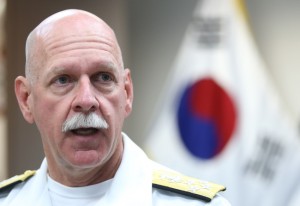- California Assembly OKs highest minimum wage in nation
- S. Korea unveils first graphic cigarette warnings
- US joins with South Korea, Japan in bid to deter North Korea
- LPGA golfer Chun In-gee finally back in action
- S. Korea won’t be top seed in final World Cup qualification round
- US men’s soccer misses 2nd straight Olympics
- US back on track in qualifying with 4-0 win over Guatemala
- High-intensity workout injuries spawn cottage industry
- CDC expands range of Zika mosquitoes into parts of Northeast
- Who knew? ‘The Walking Dead’ is helping families connect
US prepared for N. Korea’s SLBM threat

Adm. Scott Swift, the commander of the U.S. Pacific Fleet, speaks during a group interview with Yonhap News Agency and other media outlets on July 20, 2015. (Yonhap)
SEOUL, July 20 (Yonhap) — North Korea’s development of submarine-launched ballistic missiles is “very destabilizing” to the security of the Asia-Pacific region and the United States is fully prepared to respond to any contingency situation, the commander of the U.S. Pacific Fleet said Monday.
The assurance by U.S. Navy Adm. Scott Swift came amid growing military threats on the Korean Peninsula, especially after North Korea’s test-firing of a submarine-launched ballistic missile in May.
It is very difficult to confirm the North’s SLBM development due to a lack of transparency, the admiral said, refusing to say whether the test was real or only a photo shoot, as some critics claimed.
“Even if it was a photo shoot, there was a desire to pursue that capability and that is very destabilizing. So we need to approach it as if it is real,” Swift said in a meeting with select reporters at the U.S. military base in the Yongsan district of Seoul. “Which is exactly the position that Gen. (Curtis) Scaparrotti (the commander of U.S. Forces Korea) has directed that we must assume it’s real.”
The Pacific Fleet commander is in Seoul to hold meetings with Adm. Choi Yoon-hee, chairman of South Korea’s Joint Chiefs of Staff, and Navy Chief of Staff Adm. Jung Ho-sup as well as top U.S. envoy to Seoul Mark Lippert.
The admiral stressed that given the uncertainly, the U.S. is confident with its ability to “respond to any contingency,” also pledging a full U.S. commitment to safeguarding the region.
“The only Navy that is more powerful than the Pacific Fleet is the U.S. Navy … So I am very confident that despite the uncertainly on the peninsula within the maritime domain we are fully prepared to support Gen. Scaparrotti and Chairman Choi and do whatever may be necessary as of the present and future.”
The Pacific Fleet is the Navy arm of the U.S. Pacific Command, which commands U.S. military operations in the Indo-Asia-Pacific region, which covers nearly 50 percent of the world’s entire surface area.
Touching on U.S. efforts to fend off Chinese military domination in the disputed South China Sea, Swift also confirmed his participation in a surveillance flight mission there over the weekend.
During the previous stop in the Philippines of his on-going Asian trip, the admiral joined a seven-hour fight over the disputed area on board the new U.S. spy plane P-8A Poseidon in a move feared to escalate tension with China.
China has warned the U.S. to stay away from the regional issue, but the U.S. has pledged counter efforts to safeguard the freedom of navigation there.
“This was the routine flight that we fly on the region on a regular basis … this was an opportunity for me to get first hand insight as to the capability and capacity of the P-8 in a way that did not impact their on-going operations,” the Pacific Fleet commander noted.
“I am not to say exactly where it went and what it did, but I was very impressed with it,” he added, declining to disclose the specifics of the flight.
Reasserting U.S. commitment in the region, Swift said “we have forces deployed throughout the region to demonstrate the U.S. commitment to freedom of navigation,” adding upholding international rules and laws have helped keep stability and prosperity of the region over the past 70 years or so.
Asked whether South Korea should also join the U.S. in tackling Chinese military assertion in the South China Sea region, Swift indirectly urged the ally to join efforts.
“Freedom of navigation, the enforcement of international norms, standards, rules and laws is something that comes naturally to those of us operating in the maritime domain,” he said, although “that question is really for the Republic of Korea to decide.”















